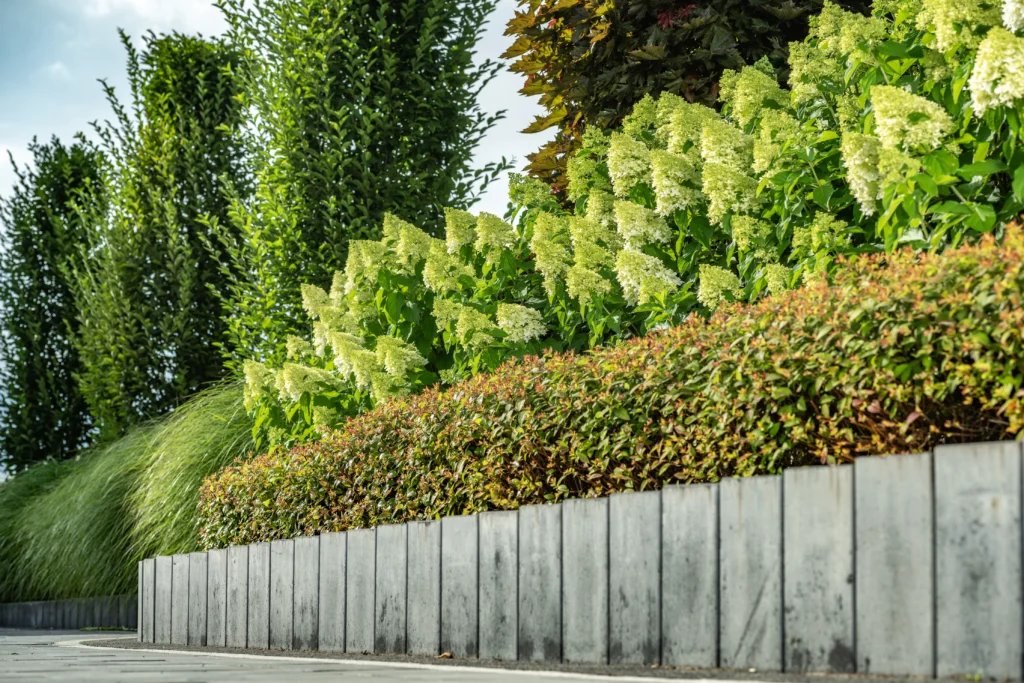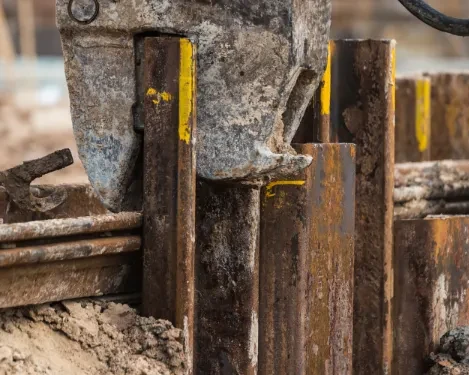Commercial Retaining Walls: Guide, Uses, Benefits, & More
Commercial retaining walls are essential in supporting infrastructure, managing soil, and preventing erosion in large-scale developments. Whether you’re planning an industrial facility, municipal project, or urban commercial property, understanding the types of retaining walls available is key to choosing the best solution. This guide dives into the most effective commercial retaining wall types, from mass concrete walls to tie-back systems, breaking down their uses, benefits, and ideal applications. While we’re focused on helping you understand your options, we’re also here to bring your retaining wall project to life.
At Piers and Piles, we specialize in delivering durable, expertly crafted retaining walls for properties across Long Island, Brooklyn, and Queens. If you’re ready to discuss your project, contact us today to work with the local experts who know what it takes to build resilient, long-lasting solutions.
For the Best Quality Retaining Walls in Long Island, Contact Piers and Piles Now for a Free Expert Assessment!

Commercial Retaining Walls Types
Commercial retaining walls are essential for creating safe, functional, and durable spaces in industrial and commercial environments. With so many options available, each designed to address specific challenges like heavy loads, space constraints, and groundwater management, it’s important to understand which solution is right for your project.
This guide highlights the most effective types of commercial retaining walls, detailing their unique features, benefits, and ideal applications. Whether you’re tackling deep excavations, stabilizing slopes, or supporting infrastructure in high-traffic areas, the following solutions offer a tailored approach to meet the demands of any commercial development.
Types of Commercial Retaining Walls
Whether your project is a commercial retaining wall or residential retaining wall, retaining walls play a vital role for projects needing stability, soil retention, and structural support. Below, you’ll find a detailed overview of the most effective types of commercial retaining walls, each tailored to address specific challenges like heavy loads, space constraints, or water management. Looking for insights on residential retaining walls or solutions for coastal properties? Check out our comprehensive guide in the “Types of Retaining Walls” blog to learn more about these specialized options.
Secant pile walls are constructed by drilling overlapping reinforced and unreinforced concrete piles to create a continuous, water-resistant barrier. This method is ideal for sites with groundwater challenges, offering reliable stability and protection against lateral soil pressures and water infiltration. Commonly used for basements, deep excavations, and flood-prone areas, these walls are a practical choice for commercial developments requiring robust retaining solutions.
Mass concrete retaining walls rely on their substantial weight to resist lateral soil pressure, making them an ideal solution for industrial facilities requiring extreme durability. These heavy-duty walls are designed to support significant load demands and are commonly used in areas where strength and resilience are paramount. Their straightforward construction ensures long-lasting performance in high-demand commercial and industrial applications.
Contiguous pile walls consist of closely spaced concrete piles that create a solid barrier to retain soil in deep excavations. These walls are frequently used in commercial projects requiring support for basements, underground parking structures, and other deep foundations. With their dependable design, they offer strong lateral stability and prevent soil movement in confined spaces.
Tangent pile walls are constructed with adjacent concrete piles that touch but do not overlap, forming a continuous retaining structure. This space-efficient solution is ideal for commercial developments where excavation room is limited. Tangent pile walls provide effective soil retention while minimizing disruption, making them a practical option for densely developed urban areas.
Tie-back retaining walls use anchors drilled into the surrounding soil or rock to provide additional stability for tall retaining walls. These walls are designed for commercial projects requiring reliable support in high-traffic zones or areas with heavy load demands. Their anchored design ensures optimal performance, even in challenging conditions, making them ideal for retaining structures with significant height and load requirements.
Soil nail walls stabilize slopes by reinforcing soil with steel bars (nails) inserted at an angle into pre-drilled holes and grouted in place. This technique is ideal for expansive commercial properties with sloped terrain, effectively securing the soil and protecting surrounding infrastructure. These walls are frequently used for slope stabilization in urban developments and large-scale commercial projects.
Anchor retaining walls provide superior support by using tensioned anchors drilled into the soil or rock behind the wall. This design makes them ideal for heavy-load applications, such as industrial facilities, large-scale parking structures, and other demanding commercial projects. Their anchored construction ensures maximum stability, even in challenging environments with high lateral pressures.
Post-and-panel retaining walls use a modular system where precast panels fit between vertical posts, offering an economical and efficient solution for large retaining projects. This design simplifies installation while providing strong and durable soil retention. Commonly used in expansive commercial developments, these walls are ideal for projects requiring cost-effective and reliable retaining structures.
Concrete panel retaining walls offer versatility and durability, making them suitable for diverse commercial applications such as parking lots, industrial complexes, and storage facilities. These walls are built using modular panels that combine strength and adaptability for long-lasting performance. Their ability to meet various project requirements makes them a preferred choice for commercial developments needing reliable soil retention.
Flexible pavement retaining walls are designed to accommodate shifting soil and repeated traffic loads, making them an excellent choice for roadways and parking lots. Their adaptable construction combines strength with flexibility, ensuring long-term performance in commercial paving projects. These walls are a reliable solution for managing soil movement in high-traffic areas.
The Right Retaining Wall for Your Projects
Choosing the right commercial retaining wall is crucial to the success and longevity of your project. Several factors must be considered to ensure that the retaining wall you select not only meets your immediate needs but also stands the test of time. Here are the key factors to keep in mind:
Site Conditions
Understanding the specific conditions of your site is the first step in selecting the best retaining wall type for your project.
Soil Type: Different retaining walls perform better with certain soil types. For example, mass concrete retaining walls are excellent for sandy or loose soils, while soil nail walls are ideal for cohesive soils.
Slope: The steepness of the slope affects the type of retaining wall required. Steeper slopes may necessitate tie-back retaining walls or secant pile walls to provide additional support.
Water Table: High water tables can impact the stability and longevity of retaining walls. Secant pile walls and water-resistant retaining walls are recommended for areas with significant groundwater presence.
Budget Constraints and Project Timelines
Balancing cost and time is essential in any commercial project.
Budget Constraints: Precast concrete panel walls offer a cost-effective solution, while mass concrete retaining walls may require a higher investment due to their durability and size.
Project Timelines: If your project has tight deadlines, modular solutions like precast retaining walls or post-and-panel retaining walls can be installed more quickly compared to traditional concrete panel walls.
Load-Bearing Requirements and Design Preferences
The functional and aesthetic demands of your project will influence your retaining wall choice.
Load-Bearing Requirements: Industrial retaining walls and tie-back retaining walls are designed to support heavy loads, making them suitable for high-traffic commercial zones and large infrastructure projects.
Design Preferences: For projects where aesthetics are important, such as commercial parking lots or urban developments, concrete panel retaining walls and post-and-panel retaining walls offer versatile designs that blend functionality with visual appeal.
By carefully evaluating these factors—site conditions, budget constraints, and load-bearing requirements—you can choose the most suitable commercial retaining wall type that aligns with your project’s unique needs. Explore our custom retaining wall solutions to find the perfect match for your commercial development.
Commercial Retaining Wall Applications
Commercial retaining walls are essential components in a variety of large-scale projects, providing stability, support, and aesthetic value. Understanding the diverse applications of retaining walls can help you determine the best solution for your specific needs. Here are some key applications of commercial retaining walls:


Industrial Facilities
Industrial facilities often require robust and durable retaining walls to support heavy machinery, storage areas, and production units. Industrial retaining walls such as mass concrete retaining walls and tie-back retaining walls provide the necessary structural support to manage soil stability and prevent erosion in high-load environments.
Commercial Parking Lots
Parking lots need retaining walls to manage soil retention, prevent water runoff, and maintain structural integrity. Flexible pavement retaining walls and precast concrete panel walls are ideal for these applications, offering adaptable designs that can handle frequent traffic loads while enhancing the overall appearance of the parking area.
Municipal and Public Projects
Municipal projects, including parks, public plazas, and government buildings, benefit from retaining walls that provide both functionality and aesthetic appeal. Concrete panel retaining walls and post-and-panel retaining walls are popular choices for these settings, as they offer versatility and durability while blending seamlessly with public spaces.
Roadways and Transportation Infrastructure
Retaining walls play a crucial role in supporting roadways, highways, and transportation hubs. Contiguous pile walls and secant pile walls are commonly used in deep excavation projects and areas with high groundwater levels, ensuring the stability and safety of transportation infrastructure.
Waterfront and Coastal Commercial Sites
Waterfront and coastal commercial sites are particularly vulnerable to flooding and erosion. Secant pile walls and anchor retaining walls provide the necessary protection against storm surges and water infiltration, making them essential for businesses and developments located near water bodies.
For the Most Reliable Commercial Retaining Walls In Long Island, Call On Piers and Piles Today for Your Free Assessment!
Choosing the right commercial retaining wall is a critical decision that impacts the stability, safety, and aesthetic appeal of your project. By understanding the different types of commercial retaining walls, considering key factors such as site conditions and budget, and partnering with experienced contractors like Piers and Piles, you can ensure that your commercial development stands strong against the challenges of soil management and erosion.
From industrial facilities and commercial parking lots to municipal projects and waterfront sites, our comprehensive retaining wall solutions are designed to meet the unique needs of each application. Invest in the right retaining wall today to protect your infrastructure and enhance the longevity of your commercial property.
Start building your community’s flood resilience today—contact Piers and Piles or local authorities to get involved!